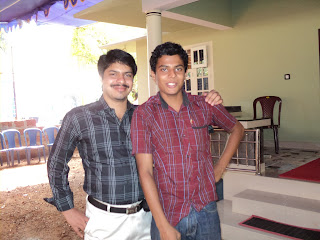Dear readers!
Good Evening!
Do you really dream of spending some quality time in
Einstein’s own residency in Germany, thinking something incredible as perhaps
Einstein did while he was living in the same house years ago? It sounds great,
right? Then this scholarship is for you! And remember this is not only for science
students, but even arts students who are bitten by an Einstein bug and who have
extra brains as Einstein had can apply for it. Your age should be under 35 to apply for this
fellowship.
Ok! If you at least dare to dream of this scholarship,
what is waiting in your way is Euro 10000 which is more than of 8 Lakh Indian
Rupee! Read very carefully the description below and if are planning to apply
then prepare a two page proposal and send them today or tomorrow even though
you have time till 15th April
If you need any kind of academic help from my side,
you may ask the same in the comment box or email me at msqfiles@gmail.com. Ok, now go for it!
All the best and good luck!
Dr. Musadhique Kottaparamban
Now read about the scholarship...
About Einstein Fellowship 2019
The
Einstein Forum and the Daimler and Benz Foundation are offering a
fellowship for outstanding young thinkers who wish to pursue a project
in a different field from that of their previous research.
The
purpose of the fellowship is to support those who, in addition to
producing superb work in their area of specialization, are also open to
other, interdisciplinary approaches – following the example set by
Albert Einstein.
Benefits
The
fellowship includes living accommodations for five to six months in the
garden cottage of Einstein`s own summerhouse in Caputh, Brandenburg,
only a short distance away from the universities and academic
institutions of Potsdam and Berlin.
The fellow will receive a stipend of EUR 10,000 and reimbursement of travel expenses.
Eligibility
Candidates must be under 35 and hold a university degree in the humanities, in the social sciences, or in the natural sciences.
How to apply
Applications for 2019 should include a CV, a two-page project proposal, and two letters of recommendation.
Applications can be submitted by email to fellowship@einsteinforum.de.
All documents must be received by April 15, 2018.
Guidelines
At
the end of the fellowship period, the fellow will be expected to
present his or her project in a public lecture at the Einstein Forum and
at the Daimler and Benz Foundation.
The Einstein Fellowship is not intended for applicants who wish to complete an academic study they have already begun.
A
successful application must demonstrate the quality, originality, and
feasibility of the proposed project, as well as the superior
intellectual development of the applicant.
It is not relevant whether the applicant has begun working toward, or currently holds, a PhD.
The
proposed project need not be entirely completed during the time of the
fellowship, but can be the beginning of a longer project.
Contact
For more information, call or fax the Einstein Forum at: phone: +49-331-271780 fax: +49-331-2717827.




.JPG)





